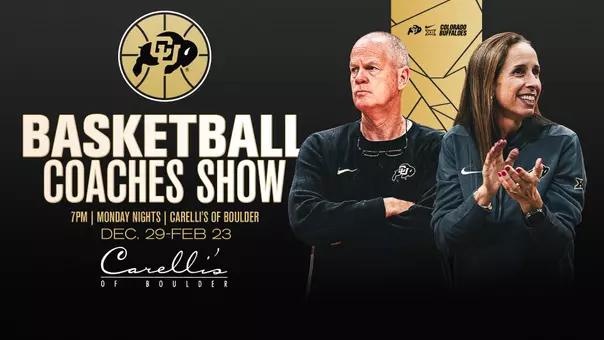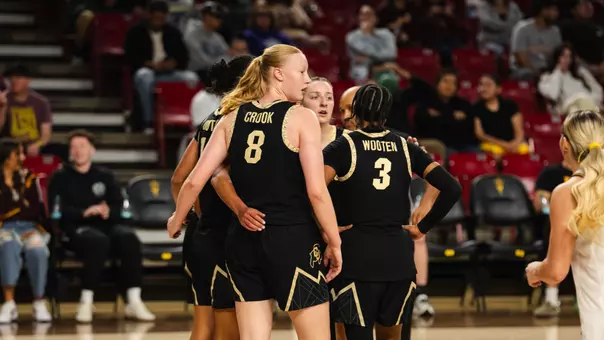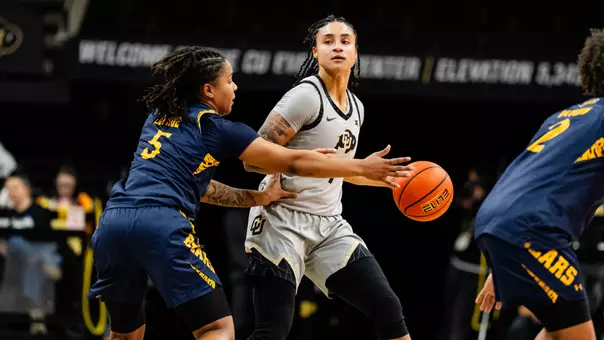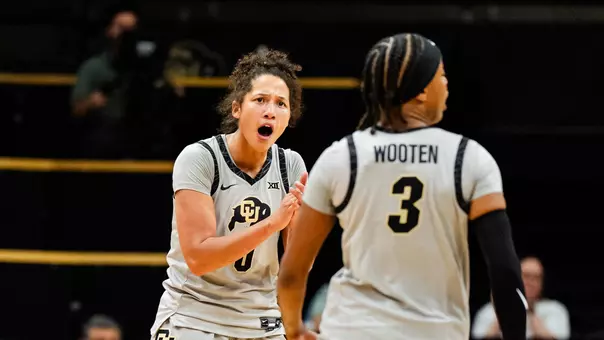Colorado University Athletics

Women's History Month: Ceal Barry Helped Bring Women's Sports To Next Level At CU
March 16, 2021 | General, Women's Basketball, Alumni C Club, Neill Woelk
BOULDER — Ceal Barry's impact on the University of Colorado, women's basketball and women's sports in general can't be overstated.
Barry, a member of the Women's Basketball Hall of Fame and the CU Sports Hall of Fame, produced numbers still unequaled in CU history.
In her 22 years at Colorado (1983-2005), she compiled a 427-242 record, a mark that still makes her the winningest coach in Colorado history. In that span, she led the Buff to four regular season Big Eight championships, four Big Eight tournament championships and one Big 12 tourney title. Colorado made 12 NCAA Tournament appearances under her guidance, reaching the Sweet 16 six times and the Elite Eight three times.
But Barry's impact reached much farther than "just" championships and NCAA Tournament appearances. Her pioneering efforts to bring women's basketball — and women's sports — into the limelight influenced generations of young girls.
"It is impossible to adequately capture the impact Ceal has had on women's basketball overall and, specifically, in Colorado," USA Basketball National Team Director Carol Callan said when Barry was inducted into the Women's Basketball Hall. "She inspired several generations of young girls to enjoy the game by putting talented, hard-working teams on the floor who competed with discipline from beginning to end. Simply, she modeled what she expected from her athletes. She stands for competing with integrity, dignity and grace. And, she has fun along the way – it is still a game."
Barry produced a long list of great players, many of whom then followed Barry's footsteps into the coaching profession.
One, Shelley Sheetz, still follows a simple guideline as she continue her coaching career.
WWCB.
"It's pretty simple," said Sheetz, now an assistant coach at Denver University. "What Would Ceal Barry do? If you think along those lines, it's pretty hard to go wrong because she did things the right way. She carried herself in a professional manner, she handled the business of athletics and the recruiting side with great ethics and values, and she won a lot of basketball games. That's a pretty good checklist."
Sheetz served as Barry's official escort during the Hall of Fame induction ceremony in 2018.
"The foundation and the path that she has paved for young coaches and the sport of women's basketball and what she has always stood for is phenomenal," Sheetz said.
Barry, the first woman ever to earn a basketball scholarship at the University of Kentucky, started her head coaching career at Cincinnati in 1979, an era when women's sports were just beginning to feel the impact of Title IX. After four seasons there, she accepted a job offer from then-CU athletic director Eddie Crowder at Colorado, where she found a department still in the throes of a financial crisis.
It was a less-than-optimal beginning.
In her first two years, the Buffs went just 16-40, a record that tested even her steely confidence.
But her boss — Bill Marolt had replaced Eddie Crowder soon after her arrival — never lost faith.
"Bill was a great motivator and leader and mentor," Barry said. "We were losing those first two years and he looked me in the eye and said, 'Keep doing what you're doing. You're recruiting good players, you're building a foundation, you're on the right track.' He's the one that really reinforced that we were on the right track."
Marolt's confidence paid off. Barry's Buffs went 21-9 in her third year, and the program was off and running.
Barry's teams soon took Boulder by storm. The Buffs won their first Big Eight title in 1989 with a perfect 14-0 mark, leading to their first NCAA Tournament appearance — and the first-ever CU Events Center sellout crowd when CU hosted the first round of the tournament.
That began an era when crowds for the CU women regularly matched the CU men. To this day, Barry's teams still have four of the top 25 crowds in Events Center history.
Those teams also helped women's sports at Colorado gain a much more equal footing with the men's teams. When Barry first arrived in Boulder, she and her assistant coaches and trainers regularly drove vans to transport the team on the road.
But soon, they were enjoying the same treatment the men's teams were receiving — chartered planes, then buses from the airport.
"To watch women's sports go from not being valued to being valued was really very special," Barry said. "You look back and you see the advancements that have been made, and it's a good feeling to know you had a role in that."
Sheetz, who played at Colorado from 1991-95, said playing for Barry "was like going to class every day."
"She was a great teacher," Sheetz said. "I loved every minute playing for Coach Barry. She challenged me to think the game more than I had ever had to. She taught me how to be an extended coach on the court and how to be a good teammate. She taught me how to wrap my arms around everybody on the floor and enhance their strengths and not get caught up in their weaknesses. She made me think strategically. If you paid attention, you learned something new every day."
Barry retired after the 2005 season and assumed a role as an associate athletic director in the department. She stepped down from that position in 2020.
But there's no doubt her coaching days are still some of the most special times in her life.
"Just a flood of memories," Barry said of her thoughts leading up to Saturday's induction. "Probably the best time of my life professionally. A lot of things came together at the right time to allow us to compete at a high level in a very competitive women's sports environment.





